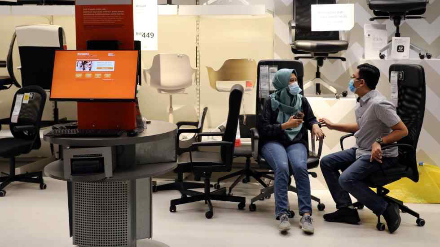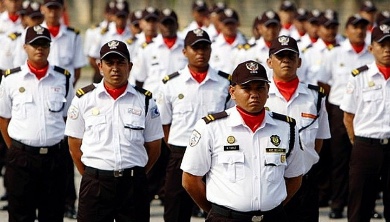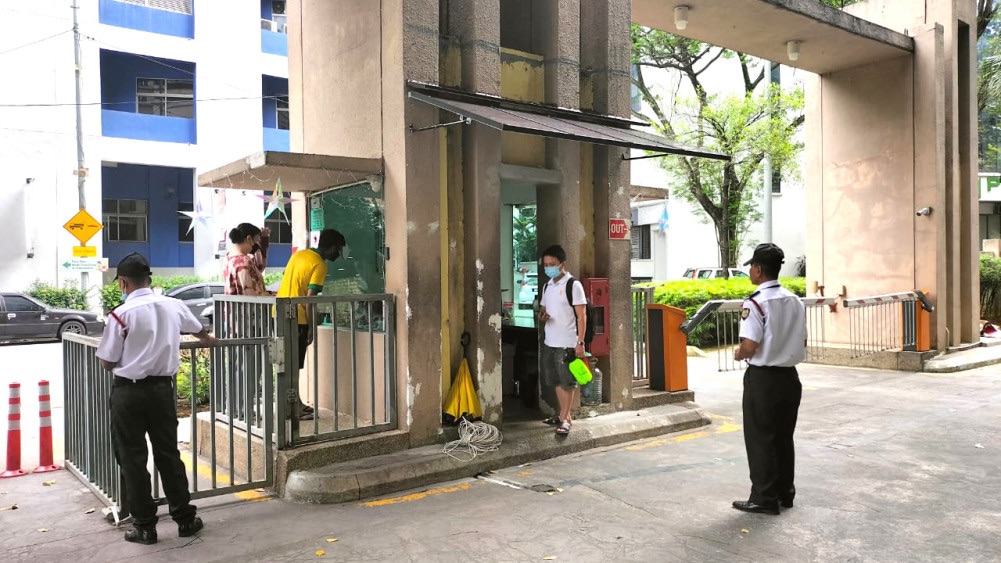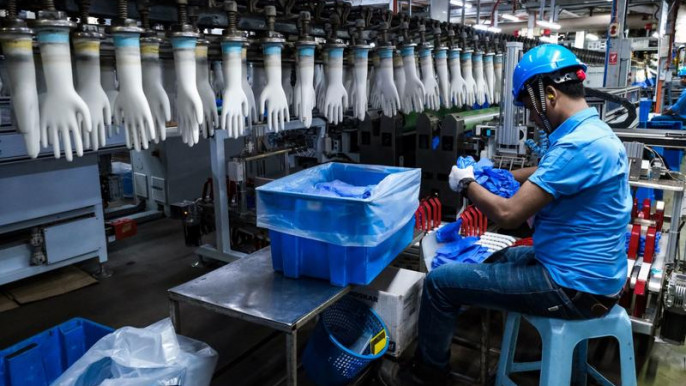20th Apr 2025 FMT News: Nepal forced to pay RM10,000 to secure security guard jobs in Malaysia, activist claims
Nepalis forced to pay RM10,000 to secure jobs in Malaysia, activist claims
Andy Hall, activist, says the sum is to cover the extortionate fees charged by recruitment intermediaries, including Malaysian security guards and Nepali manpower agents.
Original Source: FMT by Sean Augustin – 20 April 2025
PETALING JAYA: Nepalis are being made to pay up to RM10,000 to secure jobs as security guards in Malaysia, a migrant rights activist claims, adding that the “alarming” surge in recruitment costs leading to high risks of modern slavery should not be ignored.
(Bahasa Malay version) Warga Nepal dipaksa bayar RM10,000 untuk kerja di Malaysia, dakwa aktivis
Andy Hall alleged that the sum is being paid by the Nepalis to cover the extortionate fees charged by numerous recruitment intermediaries, including Malaysian security agents and Nepali manpower agents and brokers, who will help get these Nepalis employed in Malaysia in the coming weeks and months.
These costs must be paid upfront in Nepal for the workers to earn a shot at moving to Malaysia to land these jobs, which are currently being advertised, said Hall, who spoke to Nepali agents as well as subagents who were recruiting workers, and those who were interested in the jobs.
Malaysia currently allows Nepalis to be recruited as security guards in the country.
“These vulnerable workers are paying all the recruitment fees and costs themselves in Nepal, including the agents’ fees, flight tickets, medical testing costs, and visa and insurance charges,” he told FMT.
According to a now expired MoU on recruitment of workers signed between the governments of Malaysia and Nepal in 2018, most of these recruitment costs, including any recruitment intermediary’s fees, should be covered by Malaysian employers and not by the workers.
In February, a Nepali news portal reported that Malaysia has been “cold-shouldering” Nepal’s proposal to renew the MoU. Quoting officials from Nepal’s labour, employment and social security ministry, HimalPress reported that “Malaysia has shown little interest in revisiting the MoU due to the existing syndicate in the medical check-up sector for migrant workers”.
Hall said: “The situation has become one where Malaysian security agents are paid large sums of illicit money or bribes collected in Nepal and transferred to Malaysia to take Nepali workers from certain Nepali manpower agents competing to get Malaysian security guard demands, rather than the other way around, where the security agency should be paying costs to recruit these workers themselves.”
He said if Nepali workers paid between RM3,800 and RM5,000 in the past to work in the Malaysian security sector, they will now have to cough up between RM8,000 and RM10,000.
Increase in recruitment cost for security guards in Nepal
The increase in recruitment cost for Nepali security guards is another sign that the Malaysian foreign worker recruitment market is out of control, Hall said.
This would lead to the creation of a new batch of “modern slaves”, referring to the enormous debt these migrants would incur that makes them vulnerable to exploitation.
As it stands, he said, Nepali security guards are already vulnerable to systematic abuse from exploitative recruitment intermediaries, security guard agencies, and sometimes, even law enforcement officials and the public.
“Many are overworked and underpaid. Their freedom of movement is limited through document confiscation and an inability to resign, and they are manipulated and poorly housed.
“Urgent attention needs to be placed on the increasingly abusive and extortionate recruitment of these vulnerable individuals, and the awful conditions in which they work and live,” he said.
He urged the Malaysian and Nepali governments, the Nepali embassy in Malaysia, as well as the security industry and the international community to address this “increasingly dire situation”.
—
SajahSabal 15th July 2025 – Foreign employment: The cost of Nepali security guards going to Malaysia is increasing unnaturally, the Nepal Ministry of Labor is a mute spectator
Even on the occasion of the security guard that only Nepalis can get, the government is silent on the issue of Nepali manpower entrepreneurs buying the demand. The government is not investigating why entrepreneurs are reaching out to buy the demand that comes from Nepali manpower, no matter where they come from. If this situation is left unchecked, unhealthy competition is going on between Nepali entrepreneurs. Due to which the cost of Nepali workers going to Malaysia for security guards is increasing.
Anil Adhikari
2 Jestha 2082, Thursday 16:42
Kathmandu.
Employment as a security guard in Malaysia is an opportunity only available to Nepalis, but Nepal has not been able to make good use of it. While Nepali security guards are facing high costs when they go to Malaysia, the concerned parties are silent. Instead, it is alleged that there is a situation of bargaining for certification of demand for workers from the Nepali embassy in Malaysia.
Neither the embassy nor the Ministry of Labor is interested in answering the question of how young people are forced to go to Malaysia at such high costs, even though Malaysia is the only opportunity that Nepalis have been given. The agencies, which are making the foreign employment sector more profitable than the rest, do not even want to raise questions about this.
Recently, complaints have been received about the sudden increase in the cost of employment in Malaysia, which has been partially closed for some time. The Ministry of Labor, Employment and Social Security is a mute spectator even when workers are openly charged high fees. The monitoring mechanism of the Foreign Employment Department has been rendered mostly inactive.
Although Malaysia is currently importing migrant workers from more than 15 countries around the world, it has given priority only to Nepalese when it comes to security guards. Due to the Malaysian government’s trust and respect for Nepalis, Nepali guards are employed in industries, construction, administration, airports, housing, and government institutions.
Malaysia has set certain criteria for the recruitment of security guards. But in order to raise high costs, agents do not systematically inform all those who want to go to work. Since not all those who are interested are informed about the demand, employers have also hired those with weak skills for the relevant work. A network has been created so that only those who are connected to agents get such opportunities. The agent network finds workers who are willing to pay high costs, and it has been found that only those workers are included in the interview and passed the interview. Due to this unhealthy situation, employers have been complaining that they have gradually stopped getting quality workers.
For the post of security guard, there are conditions such as having a former military background, knowing English and local language, and a minimum height of 5.4 inches. However, businessmen say that workers with such qualifications are not easily available from Nepal. But the reality is different. Due to agents, information about the demands coming to manpower does not reach the general youth. Even if it does reach, it is through agents. Due to which agents are active in charging an additional amount of Rs 20,000 to Rs 100,000 than what the manpower charges.
Even on the occasion of the security guard that only Nepalis can get, the government is silent on the issue of Nepali manpower entrepreneurs buying the demand. The government is not investigating why entrepreneurs are reaching out to buy the demand that comes from Nepali manpower, no matter where they come from. If this situation is left unchecked, unhealthy competition is going on between Nepali entrepreneurs. Due to which the cost of Nepali workers going to Malaysia for security guards is increasing.
In fact, more than 800 supply companies in Malaysia have taken on the responsibility of hiring security guards. When those companies compete to win tenders at low prices, workers receive low wages and have to spend separately on food and drink, and then sell the same demand to Nepali entrepreneurs by bargaining. When workers are bought and brought in, the burden is on the workers. From here, there is fierce unhealthy competition to reduce the demand for their manpower. In some supply companies in Malaysia, when Nepali associates negotiate with Nepali entrepreneurs, the entrepreneur who pays the highest amount per worker is allowed to send Nepali workers to that demand. The government does not interfere in sending workers to demand bought at such high prices. Even if they do, everything is being accepted by consensus. Due to which this problem is increasing rather than decreasing.
There is severe labor exploitation of Nepalese security guards in Malaysia. Although they are sent from Nepal on paper to work 8 hours a day and 6 days a week, security guards who reach Malaysia do not get the 12 hours a day and full day of leave they should have, and some complain that their salaries are deducted even when they are sick. There are many complaints that they do not get the expected remuneration despite working hard.
Partially, more than 200 Nepali security guards are going to Malaysia every day after the current job opening in Malaysia. They are forced to pay Rs. 300,000 to 550,000 in the hope of getting a job. Many of them have borrowed money. On the other hand, their reality after reaching Malaysia is very painful. They have to work continuously for seven days, there is no holiday and the salary is less than the legal minimum wage in Malaysia. The accommodation is also unhealthy and crowded.
This situation is in violation of international labor standards and the Nepal-Malaysia agreement. Nepal’s foreign employment policy requires free visas and tickets to be ensured, but this is not the case. Thousands of workers in Nepal are exploited due to the lack of adequate employment, the growing influence of illegal agents, and weak government oversight.
This problem is not a problem of today. This problem has been ignored for years. There are complaints that even the embassies in the respective countries have not been as active as required in this matter.
Manpower entrepreneurs are saying that the government is the main culprit in this situation. When a businessman asked a question about this, he said, “I don’t want to compete unhealthy. But I have to. This sector cannot improve by being right alone. From ministers to employees to embassies, they need to improve. Then they should take a policy of actively monitoring the unhealthy situation and taking action.” The businessman admitted, “The opportunity that Nepal alone got is the lack of attention from government bodies.
Sourced from: https://sajhasabal.com/employment/258286/
Related reading:
ProthomAlo 18th April 2025: Bangladesh: Awami League supporters are dropping out, but the ‘Malaysia Circle’ is trying to form again
FMT 7th Apr 2025: Activist warns of syndicate threat to migrant labour reforms in Malaysia
5th Nov 2024: Bloomberg – Bangladesh Asks Malaysia to Arrest Businessmen in Migrant Trafficking Case
HimalPress 23rd Feb 2025: “Efforts underway to create Malaysia employment syndicate in Nepal”
HimalPress 19th Feb 2025: Malaysia’s reluctance stalls Nepal’s proposal to renew labor MoU
23rd Jan 2023: Focus Malaysia – Time to accord Nepalese guards respect they deserve for their sacrifices
Sourced from: FMT – 23 January 2023
SECURITY guards from Nepal are some of the most abused, extorted, and ill-treated at-risk workers in Malaysia.
These young guards often fall into situations of debt bondage through exorbitant and extortionate recruitment related fees and costs charged to them in their villages in Nepal by local agents working alongside Malaysian security guard agencies/Malaysian manpower agencies that remain almost totally unregulated.
“Malaysian security guard agencies are too often run by politically-linked former Malaysian law enforcement and military officials who act with almost total impunity,” migrant worker rights specialist Andy Hall told FocusM.

“They work the indebted guards non-stop, without rest days, housing them in poor accommodation and restricting their freedom of movement and ability to resign and leave a job through passport confiscation.”
The UK-born human rights researcher/investigator who is familiar with the labour system in Malaysia described the hardship encountered by Nepalese guards in Malaysia as a situation that requires urgent attention by both Malaysian and Nepali authorities, whatever the established cause of this latest situation is.
“The situation for Nepali security guards in Malaysia is, without doubt, too often one of systemic forced labour in the wealthy apartments, embassies, shopping malls, and luxury shops of the Malaysian capital and across the country,” he opined.
Poor treatment of Nepalese security guards
Hall’s comment on the poor treatment of Nepalese security guards in Malaysia was prompted by an article in Nepalese portal ekantipur.com entitled “Nepali Guards in Malaysia: A Unique Market Without Profit”.
The article in the Nepalese language, among others, claimed that Nepalese security guards in Malaysia work 12 hours daily “yet not paid the specified minimum wage and overtime because the recruitment process is not transparent”.
Below is an excerpt of the daily ordeal faced by security guard Umesh Chaudhary who is based at the Kota Raya shopping mall in Kuala Lumpur (his employer has deployed three Malaysians and six security guards in Nepal at that venue):
There are two shifts of 3-3 people, my group works from 6am to 6pm while the other team works from 6pm to 6am. You have to leave the camp at 5am to arrive for duty at 6am.
After finishing duty at 6pm, we reach the camp only at 7pm in the evening. It is the same for 30 days of the month, there is no day off. If the leave is taken immediately, the salary will be cut.
You cannot call on duty. I talk to my wife and children only once a week. There is no leisure at home when you are in your room. I get busy when I have free time.
The monthly salary I get for performing this duty is RM1,790. I have not received the minimum wage of RM1,500 set by the Malaysian government.
My minimum salary is RM1,100. I earn RM1,790 only after working four hours of overtime daily and during my weekly off-days.
I flew to Malaysia in the second week of July 2022after paying 160,000 Nepalese rupees (RM5,322) to Worldways Manpower International company.
After five months of my arrival in Malaysia, I have not been able to pay the debt incurred. There was no work for one-and-a half-month after coming to Malaysia and no money. I was given a salary slip of RM700 which I spent RM320 on food. The amount of was reduced to RM420 in the second month. – Jan 10, 2023
Financial Times 17th April 2023: Ikea cuts ties with security services supplier over labour policy breach
Original Source: Financial Times – 17 April 2023
Internal audit reveals Nepalese migrants who worked as guards in Ikea retailer’s Malaysian stores had paid to get jobs.

Ikea stores in Malaysia have severed ties with a labour provider after an internal investigation found there had been a breach of the furniture retailer’s own policies.
Original source: Financial Times – by Oliver Telling
Many security guards in Ikea’s Malaysian stores had paid fees to secure jobs, according to the retailer’s investigations. The findings, unreported until now, come as leading western brands face growing scrutiny from regulators and investors over labour issues in their international operations.
Ikea’s investigation was launched after a campaigner reported workers from Nepal had paid fees as high as $1,000 to obtain jobs as security guards in Malaysia, according to communications seen by the Financial Times. The probe was led by Inter Ikea, which oversees the brand’s franchise stores, and Ikano Retail, which runs Ikea stores in Malaysia as well as Singapore, Thailand, the Philippines and Mexico.
Ikano, which is owned by the Kamprad family that founded Ikea, said the inquiry confirmed “many of the security guards working in our Malaysia business had paid recruitment fees”, contravening its code of conduct rules. The group said its probe had revealed “multiple layers of subagents involved in the process in rural villages”.
Campaigners say brokers and recruiters charging fees from workers looking for jobs is an endemic problem in many developing countries. Workers often take out loans to cover the cost. For multinational brands that rely on local agents, such problems in the supply chain are often a blind spot, say campaigners.
Debt bondage is recognised as an indicator of forced labour by the UN’s International Labour Organization, whose guidelines state workers should not be charged “any fees or related costs for their recruitment”.
Nepal’s numerous unlicensed hiring agencies are among the most exploitative
Ikano said: “After many weeks of negotiation with our supplier, we were unable to resolve our concerns and have subsequently terminated our relationship.” The company declined to confirm its former supplier and the Financial Times was unable to contact it for comment.
Ikano said the incident had been reported to local authorities and the Nepalese embassy. Ikea, whose roughly 460 stores are owned by a sprawling network of franchisees globally, is the latest brand to be caught up in a controversy over recruitment fees.
Activists say Nepal’s numerous unlicensed hiring agencies are among the most exploitative when it comes to charging workers. Nepalese migrants around the world have reportedly fallen victim to the practice, including those working on UK farms and on construction sites for the Qatar World Cup.
Ikano said it had secured a new supplier that will recruit workers directly rather than using subcontractors, adding that it would conduct follow-up audits.
31st Dec 2022: Nepali Security Guards in Malaysia – a unique market without profit (translated article and commentary)
By Andy Hall 31/12/2022

Security guards from Nepal are some of the most abused, extorted, and ill-treated at-risk workers in Malaysia
Security guards from Nepal are some of the most abused, extorted, and ill-treated at-risk workers in Malaysia. These young guards often fall into situations of debt bondage through exorbitant and extortionate recruitment-related fees and costs charged to them in their villages in Nepal by local agents working alongside Malaysian security guard agencies/Malaysian manpower agencies that remain almost totally unregulated. Malaysian security guard agencies are too often run by politically linked former Malaysian law enforcement and military officials and act with almost total impunity, working the indebted guards non-stop, without rest days, housing them in poor accommodation and restricting their freedom of movement and ability to resign and leave a job through passport confiscation. The situation for Nepali security guards in Malaysia is, without doubt, too often one of systemic forced labour in the wealthy apartments, embassies, shopping malls, and luxury shops of the Malaysian capital and across the country. The situation continues to require urgent attention by both Malaysian and Nepali authorities, whatever the established cause of this latest incident.
See below a google translation from Nepali to English of a recent newspaper article entitled ‘Nepali Guards in Malaysia: A Unique Market Without Profit’ written by Hom Karki and published by Kantipur. Also see my recent comments on this topic at: “Saifuddin must regulate security agencies to curb poor treatment of Nepalese guards” (https://focusmalaysia.my/saifuddin-must-regulate-security-agencies-to-curb-poor-treatment-of-nepalese-guards/)
16th Dec 2022 News: Nepali Guards in Malaysia – a unique market without profit (Google Translate from Nepali language)
Sourced from: HERE

December 16, 2079 (Nepali)
By Hom Karki
Malaysia takes security guards only from Nepal
Malaysia takes security guards only from Nepal, but even if they work 12 hours a day, they do not pay the specified minimum wage and overtime, because the recruitment process is not transparent, the trend of unskilled workers is increasing.
KUALA LUMPUR, Malaysia — Umesh Chaudhary of Sunsari stood guard at the gate of a commercial building. Dressed in a white shirt and black pants, he was busy checking vehicles entering the building. “It’s 12 hours a day, the car comes every now and then, everyone had to be questioned,” he was saying, “When you send in without questioning, the supervisor watches the CC camera, even if you find a small mistake, you are scolded.”
Special Security Service has got the responsibility of protecting this building in Kotraya in Kuala Lumpur, Malaysia. It had deployed three Malaysians and six Nepalis as ‘security guards’. “There are two shifts of 3-3 people, my group works from 6 am to 6 pm, the other team works from 6 pm to 6 am,” he said. You have to leave the camp at 5 am to arrive for duty at 6 am.
After finishing duty at 6 o’clock, we reach the camp only at 7 o’clock in the evening. “It is the same for 30 days of the month, there is no day off, if the leave is taken immediately, the salary will be cut,” said Choudhary, “You cannot call on duty. He talks to his wife and children only once a week. There is no leisure at home when you are in your room. He gets busy when he has free time.’
The monthly salary he gets for doing this duty is 1,790 ringgit (about 53,700 rupees). Chaudhary has not received the minimum wage of 1500 ringgit set by the Malaysian government. His minimum salary is 1100 ringgit. He earned 1790 ringgit only after working four hours of overtime daily and four days off in a week. He flew to Malaysia in the second week of last July after paying Rs 160,000 to Worldways Manpower International Company.
Employer companies contract security guards on an hourly basis. Competing to get the contract.
“All of our friends tried to go to the Nepalese embassy after not even getting the minimum salary of Malaysia. As soon as the employer company found out, they scattered everyone and put them on duty in different places. We were never able to unite,” he said. Everyone does. The one who always answers that everyone is fine, you are the only one who is complaining.’
He said that even after five months of his arrival in Malaysia, he has not been able to pay the debt he incurred. He said, “There was no work for one and a half months after coming to Malaysia, and no money.” He was given a slip of 700 ringgit salary. Deducted 320 ringgit from the money eaten. The second month cut 420 ringgit.
Even after giving full duty, they deduct money on various pretexts. Many friends who came with us left the company because the salary was not good. I also sometimes feel like leaving the company and going to the machine. This is how I remember the faces of my wife and children at home. He fears that he will be deported if he is immediately caught by the police. I do not live illegally. When the loan runs out, he will go.
***
According to the Nepali Embassy in Kuala Lumpur, most of the problems and complaints of Nepali workers in Malaysia are related to security guards. “There are complaints from workers about paying less than the stipulated salary, not giving overtime payment and not providing treatment on time. 90 percent of the complaints are from security guards and sanitation workers,” said Deepak Dhakal, a former labor councilor from Malaysia who returned to the Ministry of Labor on December 4 after completing his tenure. They are deprived of getting services and facilities.’
Malaysia does not set a separate salary for security guards. Employing companies pay security guards based on the salary determined for the workers working in the industrial sector. As they work four hours of overtime a day and only 30 days a month, the salary of security guards is very low compared to workers in other sectors.
The Nepali Embassy allows security guards only on the condition that they pay 2,650 ringgit
The Nepali Embassy allows security guards only on the condition that they pay 2,650 ringgit (about 79,000 rupees) per month. The embassy fixed a lump sum of 2650 ringgit with minimum salary of 1500 and overtime of 1150. It is difficult to find an employer company that brings in security guards as per the requirements of the embassy. “In the current market, you can find a security guard with a salary between 1800 and 2200 ringgit, you have to find a company that pays more than that,” said Krishna Ghartimagar from Pokhara, “Companies compete to get the contract.” And they kick us in the stomach.’
Security companies based on supply base do not take into account the salary worked during the four-day weekly holiday of the month in the monthly salary set by the embassy. While working for four days, the Nepali security guard should get an additional 461 ringgit. Adding this, the monthly salary of one security card becomes 3,086 ringgit (92,000 rupees). “According to Malaysian rules, it is difficult to find a company that pays this kind of salary,” a director of a company that supplies security guards told Kantipur, “Employing companies take contracts for security guards on an hourly basis.” Pipeai is competing to get the contract.
Currently, the companies say that the contract is running at a rate of 9.50 ringgit to 12 ringgit per hour. “There is competition by going below the government rate, and when this happens, the salary, overtime and accommodation that the workers get will vary,” he said, “since there is no monitoring from anywhere, the workers are being killed.”
Some businessmen claim that most ‘sites’ (workplaces) work only 10 hours a day. “The standards of the embassy are not practical, I pay according to the basic salary, overtime should be paid according to the prevailing rate, it should not be written that the workers have to work 12 hours and 26 days in the beginning, that is why it is making a difference,” he said.
Before covid, security guard jobs were considered safer than working in industries and factories in Malaysia. At that time earning two thousand ringgit was the ‘fix’. There was no tension. There was no uncertainty like in the industry, there was no worry about overtime, hotels, businesses needed security guards in every field. He was constantly working. I used to reach the target of earning this much in two years,” said Vinod Thapa, president of the Non-Resident Nepali Association, Malaysia.
It has been found that continuous duty is adversely affecting the health of Nepalese security guards. “We don’t have a balanced life, sometimes we feel like machines,” said Sagar Nemwang of Jhapa, “Many of those who die of heart attacks, kidney failure, diabetes and blood pressure are security guards.”
Malaysia has banned the supply of security guards from countries other than Nepal
Malaysia has banned the supply of security guards from countries other than Nepal, but Nepal has not been able to benefit accordingly. A license (permit) to supply and supply security guards is only granted to companies with a 70% shareholding by the former High Security Officer of Malaysia. There are about 800 such companies. Half of these companies only supply Nepali security guards.
According to the Department of Foreign Employment, 2,414 people went to the security guard in the first three months after Malaysia opened up for workers after the Covid-19. According to Thapa, president of the Non-Resident Nepalese Association of Malaysia, due to lack of monitoring, the specified minimum wage was not fully implemented. “If the government of Malaysia and Nepal make it clear that they will take action against both sides if they pay less than this, the workers will not be in trouble,” he said, adding that the competition between manpower has also worsened the environment.
According to the labor agreement between Nepal and Malaysia in 2075, arrangements have been made to send security guards. According to the labor agreement, the policy of zero cost should be applied to the security guards as well, but it is not being implemented. There was a lot of pressure from security guard supply companies to have this labor agreement with Malaysia. Malaysia did not immediately allow security guards to be brought in after covid. Allowed to bring workers only in manufacturing and agriculture sector.
“Malaysia has a policy of using locals, but the locals do not work as reliably as the Nepalis,” said Thapa, “The rate of the locals is still lower than the Nepalese, but the demand for the Nepalese is high.” After covid eight months without permission to bring in security guards many visaless people were employed in the market. When Bengalis and Pakistanis also started meeting, the security guard was opened in Malaysia.
Before Covid, security guard supply companies used to pay manpower companies between 1700 and 2500 ringgit for sending a security guard. Instead of implementing the policy of zero cost, on the contrary, the manpower company itself gave high commission to the employer company. “Here it has become so bad that the employer who tries to hire a security guard by giving a commission, he cannot go to the contract competition,” he said, “On the other hand, the manpower company sent an unskilled person who does not even know how to salute as a security guard.” When the quality was weak, the employer had to send four people instead of two.
Employers are not happy with the guards who are unable to answer even when asked for their names. “We don’t even know what the security guard should do, in such a situation, if we have four security guards, we have to add two more, and we have to pay the cost of the additional two from our own pocket, the first party does not pay,” said the employer.
The employer says that the kind of security guard that is supposed to come from Nepal is not coming. A security guard should be able to speak English normally. You should be able to take notes. Physically, the height should be 5.4 inches, but because of the fierce competition, the quality was not taken into consideration,” he said.
The quality of Security Guards in Nepal has deteriorated
Due to the unhealthy competition on both sides, the quality of Nepalese has further deteriorated. At present Bhupu soldiers cannot be recruited at the salary they get in Malaysia. The employer will not pay the cost of training and sending them, from where should we train and send them? The manager of a manpower company said, “The minimum salary is 35 ringgit. We are also given a service fee equal to one month and we send trained people. If there is no investment, it is incompetent.
Nepal has not been able to effectively engage in labor diplomacy with the Malaysian government to take advantage of the opportunities that Nepal has got. The then Minister of Labour, Employment and Social Security Krishna Kumar Shrestha, who visited Malaysia last May (14-19), had an interview with his Malaysian counterpart regarding ‘jobs obtained in Malaysia and getting more jobs in the future’, but he did not discuss concretely the economic exploitation of security guards. “It was decided to make an agenda for a joint meeting between the two countries to discuss the problems faced by the security guards, but the meeting is not being held,” said former labor councilor Dhakal.
“Validation of demand only after commitment of salary”

Malaysia has always respected the role played by Nepali security personnel to protect the sovereignty and independence of Malaysia. Security guards had/have a better chance if Nepalis could be identified more correctly. There is good diplomatic relationship between Malaysia and Nepali, more than that there is a close relationship. This matter should be exposed at the top level of the state. Nepal is only one source country for security guards. The directors of cleaning and security (where labor problems are most common) are called to the embassy when verifying new applications.
We look at the track record of that company to see if it has had problems in the past. Now there is a problem of arrest by the police and deportation due to lack of official hostels. We check whether the accommodation is up to standard. We check whether the wages mentioned in the labor contract have been paid. We see if there is a bank account.
We are increasing direct contact with employers. The skills of the security guards coming from Nepal should be refined a little. There is a complaint here that basic information has come. The employer complains that I wish I had a security guard to make me feel like I have a security guard. It is necessary to establish a good training center on security matters. Security personnel should be given special training.
language version below)
मलेसियामा नेपाली गार्ड : बिनालाभको एकलौटी बजार
पुस १६, २०७९
मलेसियाले नेपालबाट मात्रै सुरक्षा गार्ड लैजान्छ तर दिनको १२ घण्टा काममा लगाउँदा पनि तोकिएको न्यूनतम तलब रओभरटाइम दिँदैन, भर्ना प्रक्रिया पारदर्शी नहुँदा अदक्ष कामदार जाने क्रम झन् बढ्दो छ

क्वालालम्पुर, मलेसिया — एउटा व्यापारिक भवनको गेटमा सुनसरीका उमेश चौधरीले पहरा दिइरहेका थिए । सेतो सर्ट र कालो पाइन्टलगाएका उनी भवनभित्र छिर्ने सवारीसाधनलाई जाँच गर्न व्यस्त देखिन्थे । ‘दैनिक १२ घण्टा यत्तिकै हो, छिनछिनमा गाडी आउँछ, सबैलाईसोधपुछ गर्नैपर्यो,’ उनी भन्दै थिए, ‘सोधपुछ नगरी भित्र पठाउँदा सीसीक्यामरामा सुपरभाइजरले हेरिराख्छ, सानो गल्ती भेटे पनि गालीखाइहालिन्छ ।’
मलेसियाको क्वालालम्पुरस्थित कोत्रायाको यो भवन सुरक्षा गर्ने जिम्मेवारी स्पेसल सेक्युरिटी सर्भिसले पाएको छ । त्यसले तीन जनामलेसियाली र ६ जना नेपालीलाई ‘सुरक्षा गार्ड’ का रूपमा खटाएको थियो । ‘३–३ जनाको दुई सिफ्ट छ, मेरो समूहले बिहान ६ देखि बेलुका६ बजेसम्म गर्छ, अर्को टोली बेलुका ६ देखि बिहान ६ बजेसम्म खटिन्छ,’ उनले भने । बिहान ६ बजे ड्युटी आइपुग्न क्याम्पबाट ५ बजे नैहिँड्नुपर्छ ।
६ बजे ड्युटी सकेपछि साँझ ७ बजे मात्रै क्याम्पमा पुगिन्छ । ‘महिनाको ३० दिनै यस्तै हो, कुनै दिन बिदा हुँदैन, त्यत्तिकै बिदा लिइयो भने तलबकाटिन्छ,’ चौधरीले सुनाए, ‘ड्युटीमा फोन गर्न मिल्दैन । श्रीमती र छोराछोरीसँग सातामा एक पटक मात्रै कुरा हुन्छ । आफू कोठामा भएकाबेला घरमा फुर्सद हुँदैन । उता फुर्सद भएका बेला आफू बिजी भइन्छ ।’
यसरी ड्युटी गरेबापत उनले पाउने मासिक तलब भनेको १७ सय ९० रिंगेट (करिब ५३ हजार ७ सय रुपैयाँ) हो । चौधरीले मलेसिया सरकारलेनिर्धारण गरेको न्यूनतम तलब १५ सय रिंगेट पाएका छैनन् । उनको न्यूनतम तलब ११ सय रिंगेट छ । दैनिक चार घण्टा ओभरटाइम र सातामाचार दिन बिदामा समेत काम गरेपछि मात्रै १७ सय ९० रिंगेट हात पारेको हो । उनी वर्ल्डवेज म्यानपावर इन्टरनेसनल कम्पनीलाई १ लाख ६०हजार रुपैयाँ तिरेर गत जुलाई दोस्रो साता मलेसिया उडेका थिए ।
‘रोजगारदाता कम्पनीहरूले घण्टाका आधारमा सुरक्षा गार्डको ठेक्का लिन्छन् । ठेक्का पाउन पाइपाइको प्रतिस्पर्धा छ ।’
‘मलेसियाको न्यूनतम तलबसमेत नपाएपछि सबै साथी नेपाली दूतावास जान खोजेका थियौं, रोजगारदाता कम्पनीले थाहा पाउनेबित्तिकैसबैलाई विभिन्न ठाउँमा छरेर ड्युटी हालिदियो, कहिल्यै एकजुट हुन सकेनौं,’ उनले भने, ‘म्यानपावरलाई फोन गर्छौं । सबैले गर्छन् । जसलेफोन गर्दा पनि सबैको ठीक छ, तिमी मात्रै गुनासो गरिराख्छौ भनेर जवाफ दिने गर्छ ।’
उनले मलेसिया आएको पाँच महिना बितिसक्दा पनि आउँदा लागेको ऋण तिर्न नसकेको बताए । ‘मलेसिया आएको डेढ महिनासम्म कामभएन, पैसा पनि पाइएन,’ उनले भने, ‘त्यस पछाडिको आधा महिना काम दियो । सात सय रिंगेट तलब पाउने स्लिप दिएको थियो । खाएकोपैसा ३२० रिंगेट काटेर दियो । दोस्रो महिना ४ सय २० रिंगेट काटेर दियो ।
फुल ड्युटी दिएपछि पनि विभिन्न बहानामा पैसा काट्छ । हामीसँगै आएका धेरै साथी तलब राम्रो नभएकाले कम्पनी छाडेर भागिदिए । मलाईपनि कहिलेकाहीं कम्पनी छोडेर अन्यन्त्र जाउँ जस्तो लाग्छ । यसो घरमा श्रीमती, छोराछोरीको अनुहार सम्झन्छु । तुरुन्तै प्रहरीको फन्दामापरियो भने डिपोर्ट भइन्छ भन्ने डर लाग्छ । म गैरकानुनी रूपमा बस्दिनँ । जहिले ऋण सकिन्छ, त्यहिले जाने हो ।’
***
क्वालालम्पुरस्थित नेपाली दूतावासका अनुसार मलेसियामा नेपाली कामदारका समस्या र गुनासामध्ये अधिकांश सुरक्षा गार्डसँग सम्बन्धितछन् । ‘तोकिएको भन्दा कम तलब दिने, ओभरटाइम नदिने र समयमा उपचार नगरिदिने भन्दै श्रमिकको उजुरी आउने गर्छ, ९० प्रतिशत उजुरीसुरक्षा गार्ड र सरसफाइ श्रमिकका हुन्छन्,’ कार्यकाल सकेर पुस ४ मा श्रम मन्त्रालय फर्केका मलेसियाका पूर्वश्रम काउन्सिलर दीपक ढकाललेभने, ‘सुरक्षा गार्डहरू श्रमअनुसारको तलब सेवा–सुविधा पाउनबाट वञ्चित छन् ।’
मलेसियाले सुरक्षा गार्डका लागि भनेर छुट्टै तलब निर्धारण गरेको छैन । औद्योगिक क्षेत्रमा कार्यरत श्रमिककै लागि निर्धारण गरिएकोतलबलाई आधार मानेर रोजगारदाता कम्पनीले सुरक्षा गार्डलाई तलब दिने गरेका छन् । दैनिक चार घण्टा ओभरटाइम र महिनामा ३० दिन नैकाम लगाउने हुँदा अन्य क्षेत्रका श्रमिकको तुलनामा सुरक्षा गार्डको तलब निकै कम छ ।
नेपाली दूतावासले मासिक २६ सय ५० रिंगेट (करिब ७९ हजार रुपैयाँ) दिने सर्तमा मात्रै सुरक्षा गार्ड ल्याउने अनुमति दिने गर्छ । दूतावासलेन्यूनतम तलब १५ सय र ओभरटाइम ११ सय ५० गरी एकमुष्ट रूपमा २६ सय ५० रिंगेट निर्धारण गरेको थियो । दूतावासको सर्त मानेर सुरक्षागार्ड ल्याएका रोजगारदाता कम्पनी फेला पार्न मुस्किल छ । ‘अहिलेको बजारमा १८ सयदेखि २२ सय रिंगेटसम्मको बीचमा तलब पाउने सुरक्षागार्ड भेटिन्छ, त्योभन्दा माथि दिने कम्पनी शिला खोजे जसरी खोज्नुपर्छ,’ पोखराका कृष्ण घर्तीमगरले भने, ‘ठेक्का हात पार्न कम्पनीहरूप्रतिस्पर्धा गर्छन् । अनि हाम्रो पेटमा लात हान्छन् ।’
सप्लाई बेसमा आधारित सुरक्षा कम्पनीले दूतावासबाट निर्धारित मासिक तलबमानमा महिनाको चार दिन हुने साप्ताहिक बिदामा काम गरेकोतलबको हिसाब नै गर्दैनन् । जबकि त्यो चार दिन काम गर्दा नेपाली सुरक्षा गार्डले थप ४ सय ६१ रिंगेट पाउनुपर्ने हो । योसमेत जोड्दा एकजना सुरक्षा कार्डको मासिक तलब ३ हजार ८६ रिंगेट (९२ हजार रुपैयाँ) हुन जान्छ । ‘मलेसियाको नियमअनुसार यसरी तलब दिने कम्पनीमुस्किलले भेटिन्छ,’ सुरक्षा गार्ड सप्लाई गर्ने कम्पनीका एक निर्देशकले कान्तिपुरसँग भने, ‘रोजगारदाता कम्पनीहरूले घण्टाका आधारमा सुरक्षागार्डको ठेक्का लिन्छन् । ठेक्का पाउन पाइपाइको प्रतिस्पर्धा छ ।’
अहिले प्रतिघण्टा ९.५० रिंगेटदेखि १२ रिंगेटको दरले ठेक्कामा प्रतिस्पर्धा चलिरहेको कम्पनीहरूको भनाइ छ । ‘सरकारी दररेटभन्दा मुनि गएरप्रतिस्पर्धा छ, यसो हुनासाथ श्रमिकले पाउने तलब, ओभरटाइम र बासस्थानमा फरक परिहाल्छ,’ उनले भने, ‘कतैबाट अनुगमन नभएपछिश्रमिकहरू मारमा परिरहेका छन् ।’
केही व्यवसायी भने धेरैजसो ‘साइट’ (कार्यस्थल) दैनिक १० घण्टा मात्रै काम हुने दाबी गर्छन् । ‘दूतावासको मापदण्ड नै व्यावहारिक छैन, मबेसिक तलबअनुसार दिन्छु, ओभरटाइम चलेअनुसार दिन पाउनुपर्छ भन्ने हो, श्रमिकलाई सुरुमै १२ घण्टा २६ दिन गर्नैपर्छ भनेर लेख्नु हुँदैन, त्यही भएर फरक परिरहेको छ,’ उनको भनाइ थियो ।
कोभिड अगाडि मलेसियामा उद्योग र कलकारखानामा भन्दा सुरक्षा गार्डको काम बढी सुरक्षित मानिन्थ्यो । त्यतिखेर दुई हजार रिंगेट कमाउने‘फिक्स’ थियो । कुनै तनाव थिएन । ‘उद्योगमा जस्तो अनिश्चित थिएन, ओभरटाइम लाग्ने नलाग्ने चिन्ता थिएन, होटल, व्यवसाय हरेकफिल्डमा सुरक्षा गार्ड त चाहियो । उसले निरन्तर काम दिइराख्थ्यो । दुई वर्षमा यति कमाउँछु भन्ने टार्गेट पुग्थ्यो,’ गैरआवासीय नेपाली संघ, मलेसियाका अध्यक्ष विनोद थापाले भने, ‘कोभिड पछाडिको माहोलमा केही परिवर्तन आयो ।’
लगातारको ड्युटीले नेपाली सुरक्षा गार्डहरूको स्वास्थ्यमा भने प्रतिकूल असर परिरहेको पाइएको छ । ‘हाम्रो सन्तुलित जीवन छैन, कहिलेकाहींआफैंलाई मेसिनजस्तै लाग्छ,’ झापाका सागर नेम्वाङले भने, ‘धेरै हृदयाघात, मिर्गौला फेल हुने, सुगर र रक्तचापबाट मर्नेहरू सुरक्षा गार्ड नैछन् ।’
***
मलेसियाले नेपालबाहेक अन्य देशबाट सुरक्षा गार्ड आपूर्ति गर्न रोक लगाएको छ तर नेपालले त्यसअनुरूप लाभ लिन सकेको छैन ।मलेसियाका पूर्वउच्च सुरक्षा अधिकृतको ७० प्रतिशत साझेदारी भएको कम्पनीलाई मात्रै सुरक्षा गार्ड आपूर्ति तथा सप्लाई गर्ने लाइसेन्स(अनुमति) दिइन्छ । यस्ता कम्पनी झन्डै ८ सय वटा छन् । तीमध्ये आधा कम्पनीले नेपाली सुरक्षा गार्ड मात्रै सप्लाई गर्छन् ।
वैदेशिक रोजगार विभागका अनुसार कोभिडपछि मलेसियाले कामदार ल्याउन खुला गरेको पहिला तीन महिनामा २ हजार ४ सय १४ जनासुरक्षा गार्डमा गएका थिए । गैरआवासीय नेपाली संघ मलेसियाका अध्यक्ष थापाका अनुसार अनुगमन नहुँदा तोकिएको न्यूनतम तलब नै पूर्णरूपमा लागू भएन । ‘योभन्दा तलको तलब दियो भने दुवै पक्षलाई कारबाही गर्छौं भनेर मलेसिया र नेपाल सरकारले प्रस्ट भन्न सके मात्रै श्रमिकअप्ठ्यारोमा पर्दैनन्,’ उनले भने, ‘म्यानपावरबीचको प्रतिस्पर्धाले पनि वातावरण बिग्रिएको छ ।’
नेपाल र मलेसियाबीच २०७५ मा भएको श्रम सम्झौताअनुसार सुरक्षा गार्ड पठाउने व्यवस्था गरिएको छ । श्रम सम्झौताअनुसार सुरक्षा गार्डमापनि शून्य लागतको नीति लागू हुनुपर्ने हो तर कार्यान्वयनमा छैन । मलेसियासँग यो श्रम सम्झौता हुनुमा सुरक्षा गार्ड सप्लाई गर्ने कम्पनीहरूकोठूलो दबाब थियो । कोभिडपछि मलेसियाले सुरक्षा गार्ड ल्याउन तुरुन्तै अनुमति दिएन । उत्पादन र कृषि क्षेत्रमा मात्रै श्रमिक ल्याउन अनुमतिदियो ।
‘स्थानीयलाई नै प्रयोग गर्ने मलेसियाको नीति छ तर स्थानीयले नेपालीको जति भरपर्दो काम गर्दैनन्,’ थापाले भने, ‘नेपालीभन्दा स्थानीयको रेटअझै कम छ, तैपनि नेपालीकै माग उच्च छ । कोभिडपछि आठ महिनासम्म सुरक्षा गार्ड ल्याउने अनुमति नहुँदा बजारमा धेरै भिसाविहीनलाईकाममा लगाइयो । बंगाली र पाकिस्तानी पनि भेटिन थालेपछि मलेसियामा बल्ल सुरक्षा गार्ड खुला भयो ।’
कोभिड अगाडिसम्म सुरक्षा गार्ड आपूर्ति गर्ने कम्पनीहरूले एउटा सुरक्षा गार्ड पठाएबापत म्यानपावर कम्पनीलाई १७ सयदेखि २५ सयरिंगेटसम्म दिने अभ्यास थियो । शून्य लागतको नीति कार्यान्वयन हुनुको साटो उल्टो म्यानपावर कम्पनी आफैंले रोजगारदाता कम्पनीलाई उच्चकमिसन दिने अवस्था सिर्जना भइदियो । ‘यहाँ यसरी बिग्रियो कि जुन रोजगारदाताले कमिसन दिएर सुरक्षा गार्ड ल्याउन खोज्छ, ऊ ठेक्काकोप्रतिस्पर्धामा जान सक्दैन,’ उनले भने, ‘अर्कोतर्फ म्यानपावर कम्पनीले सलाम गर्न पनि नजान्ने अदक्षलाई पनि सुरक्षा गार्डका रूपमापठाइदियो । गुणस्तरमा कमजोरी भएपछि रोजगारदाताले दुई जना पठाउनुपर्ने ठाउँमा चार जना पठाउनुपर्ने अवस्था आइदियो ।’
आफ्नो नाम सोध्दा पनि उत्तर दिन नसक्ने गार्डहरू आउने गरेको प्रति रोजगारदाता सन्तुष्ट छैनन् । ‘सुरक्षा गार्डले गर्नुपर्ने काम पनि थाहा छैन, त्यस्तो अवस्थामा चार जना सुरक्षा गार्ड राख्दा थप दुई जना थपिदिनुपर्छ, थप दुईको खर्च आफ्नै खल्तीबाट भुक्तानी गर्नुपर्छ, पहिलो पार्टीलेभुक्तानी गर्दैन,’ ती रोजगारदाताले भने ।
रोजगारदाताले ‘नेपालबाट जुन किसिमको सेक्युरिटी गार्ड आउनुपर्ने हो, त्यो किसिमको गार्ड नै नआउने गरेको बताउँछन् । ‘एउटा सेक्युरिटीगार्डमा आउने मान्छेले सामान्यतः अंग्रेजीमा कुरा गर्न सक्नुपर्यो । टिपोट गर्न सक्नुपर्छ । शारीरिक रूपमा ५.४ इन्च उचाइ हुनुपर्यो तर चर्कोप्रतिस्पर्धाले गर्दा गुणस्तरमा ध्यान गएन,’ उनले भने ।
दुवैतर्फको अस्वस्थ प्रतिस्पर्धाले नेपालीको गुणस्तर झन् खस्किएको छ । अहिले मलेसियामा पाउने तलबमा भूपू सैनिक भर्ती गर्न सकिँदैन ।‘मध्यमखालको छानेर पठाउने हो, तालिम दिएर पठाउने खर्च रोजगारदाताले दिँदैन, हामीले कहाँबाट तालिम दिएर पठाउने ?’ एक म्यानपावरकम्पनीका सञ्चालकले भने, ‘न्यूनतम तलब ३५ रिंगेट आउँछ । हामीलाई पनि एक महिना बराबरको सेवा शुल्क दिइन्छ भने तालिमयुक्त मान्छेपठाउँछौं । लगानी नभएपछि जाने त अदक्ष नै हो ।’
नेपालले पाएको अवसरलाई लाभ लिन नेपालले मलेसिया सरकारसमक्ष प्रभावकारी रूपमा श्रम कूटनीति हुन सकेको छैन । गत वैशाख (१४–१९) मा मलेसिया पुगेका तत्कालीन श्रम, रोजगार तथा सामाजिक सुरक्षामन्त्री कृष्णकुमार श्रेष्ठले मलेसियाका समकक्षीसमक्ष ‘मलेसियामाप्राप्त गरेको रोजगारी र भवितव्यमा समेत थप रोजगारी प्राप्त गर्ने’ सन्दर्भमा भेटर्वार्ता गरेका थिए तर सुरक्षा गार्डमाथि भइरहेको आर्थिकशोषणबारे भने ठोस छलफल गरेनन् । ‘सुरक्षा गार्डले खेपिरहेको समस्यामाथि छलफल गर्न दुई देशबीचको संयुक्त बैठकको एजेन्डा बनाउनेतय भएको थियो तर बैठक नै हुन सकिरहेको छैन,’ पूर्वश्रम काउन्सिलर ढकालले भने ।
‘तलबको प्रतिबद्धतापछि मात्रै मागपत्र प्रमाणीकरण’

मलेसियाको सार्वभौमिकता र स्वाधीनताको रक्षाका लागि नेपाली सुरक्षाकर्मीले खेलेको भूमिकाप्रति मलेसियाले सधैं सम्मान गर्दै आएको छ ।नेपालीलाई अझै सही ढंगले पहिचान गर्न सकेको भए सुरक्षा गार्डको झन् राम्रो सम्भावना थियो/छ । मलेसिया र नेपालीबीच असल कूटनीतिकसम्बन्ध त छँदै छ, त्योभन्दा बढी आत्मीय सम्बन्ध पनि छ । यो कुरालाई राज्यको माथिल्लो तहमा उजागर गर्नुपर्छ । सुरक्षा गार्डका लागिनेपाल एउटा मात्रै स्रोत देश हो । क्लिनिङ र सेक्युरिटीको क्षेत्र (जहाँ श्रम समस्या बढी हुने गर्छ) का निर्देशकहरूलाई नयाँ मागपत्रप्रमाणीकरण गर्ने बेला दूतावासमा बोलाउँछौं ।
त्यो कम्पनीको विगतमा समस्या छ कि छैन भनेर ट्र्याक रेकर्ड हेर्छौं । अहिले आधिकारिक होस्टल नहुँदा प्रहरीले पक्राउ गर्ने र डिपोर्ट हुनुपर्नेसमस्या छ । बासस्थानको मापदण्डअनुसार छ कि छैन भनेर हेर्छौं । श्रम सम्झौताअनुसार उल्लेख भएको तलब दिइएको छ कि छैन भनेर हेर्छौं ।बैंकमा खाता छ कि छैन हेर्छौं ।
रोजगारदातासँग नै सिधा सम्पर्क बढाइरहेका छौं । नेपालबाट लिएर आउने सुरक्षा गार्डको सीपलाई अलिकति परिस्कृत गर्नुपर्छ । बेसिकजानकारी आए भनेर यहाँ गुनासो छ । मसँग सुरक्षा गार्ड छ भन्ने अनुभव गर्न पाउने खालको सुरक्षा गार्ड भए हुन्थ्यो भन्ने रोजगारदाताको गुनासोछ । सुरक्षाका विषयमा राम्रो तालिम केन्द्र स्थापना गर्न जरुरी छ । सुरक्षामा आउनेलाई विशेष तालिम दिनुपर्छ
Focus Malaysia 6th Dec 2022: Saifuddin must regulate security agencies to curb poor treatment of guards in Nepal
Sourced from: Focus Malaysia
“Saifuddin must regulate security agencies to curb poor treatment of Nepalese guards”
AN international labour rights activist has called on newly minted Home Minister Datuk Seri Saifuddin Nasution Ismail to seriously address the plight of migrant security guards in Malaysia who are very often subject to poor working condition.
Migrant worker rights specialist Andy Hall has described Nepalese security guards as some of the most abused, extorted and ill-treated at risk workers in Malaysia.
“They are often extorted from their villages in Nepal by local agents working alongside Malaysian security guard agencies that remain almost totally unregulated,” he told FocusM.
“Malaysian security guard agencies are too often run by politically-linked former Malaysian law enforcement and military officials who act with almost total impunity.”

He added: “They work the indebted guards non-stop, without rest days, housing them like animals in poor accommodation, and restricting their freedom of movement and ability to resign and leave through passport confiscation.”
Hall’s comments came on the back of news reports that two Nepalese security guards were found dead with injuries to their faces in Taman Perindustrian Oakland in Seremban on Saturday (Dec 3) believed to be from a fight under influence of alcohol.
Although currently only Nepalese are allowed to be hired as security guards in Malaysia, former Home Minister Datuk Seri Hamzah Zainudin had said in May that Malaysia was looking at allowing licensed security firms to hire from Bangladesh, the Philippines, and Indonesia in a bid to fill vacancies in the security sector.
Security Guards in Nepal
“The situation for Nepali security guards in Malaysia is without a doubt too often one of systemic forced labour in the wealthy apartments, embassies, shopping malls and luxury shops of the Malaysian capital and across the country,” Hall further revealed.
“It continues to require urgent attention by both Malaysian and Nepali authorities, whatever the established cause of this latest incident.”
In September, Malaysian Trades Union Congress (MTUC) secretary-general Kamarul Baharin Mansor exposed that as many as 40,000 security guards in the country continue to be underpaid or paid irregularly for their work.
Sinar Harian quoted Kamarul who found that only two out of 10 companies surveyed had complied with the Employment Act 1955 in paying their security guards.
“When MTUC did the survey, we realised that their salary slips did not state the details of their overtime hours and overtime rate, and most of them were paid in a lump-sum,” he was quoted as saying.
He also claimed that many employers had not provided “punch card” to the security guards denoting the time they clocked in-and-out of work as a tactic to refuse overtime pay.
“All of these are against the law, but the security guards will not make any complaint because they are worried that their jobs will be at stake,” added Kamarul. – Dec 6, 2022
Background Reading:
HimalPress 23rd Feb 2025: “Efforts underway to create Malaysia employment syndicate”
HimalPress 19th Feb 2025: Malaysia’s reluctance stalls Nepal’s proposal to renew labor MoU
Malaysiakini 8th Aug 2020: Beatings, marathon shifts among issues faced by guards in Nepal, say rights groups
Malaysiakini 6th Aug 2020: Who guards the guards? Second Nepali claims beaten up in M’sia
Kathmandu Post 31st July 2020: Nepali embassy in Malaysia says complaint has been filed with Malaysian police over the beating of a man, who it says is a Nepali
Bernama 13th Feb 2020: Only Nepalese allowed to work as security guards – KDN
NST Feb 12th 2020: Only Nepalese given green light to work as security guards in Malaysia
Kathmandu Post 6th Dec 2019: Nepal’s mission in Malaysia approves local demand for more than 31,000 Nepali workers


